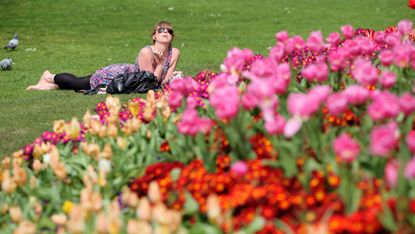Light pollution 'causes spring to arrive a week early'
Trees bud in urban areas up to 7.5 days before they appear in the countryside, says major new report

Light pollution causes spring to arrive a week early in some areas of the UK, according to a new report.
Published in Proceedings of the Royal Society B, the first significant examination of how light pollution affects plants reports that leaves appear on trees up to 7.5 days earlier in areas heavily affected by light.
The researchers, from the University of Exeter and Cornwall College Newquay, say this is likely to have a "knock-on effect on the life cycles of insects and birds that live in sync with the trees", The Guardian reports.
Subscribe to The Week
Escape your echo chamber. Get the facts behind the news, plus analysis from multiple perspectives.

Sign up for The Week's Free Newsletters
From our morning news briefing to a weekly Good News Newsletter, get the best of The Week delivered directly to your inbox.
From our morning news briefing to a weekly Good News Newsletter, get the best of The Week delivered directly to your inbox.
"If the oak tree buds earlier, [moth caterpillars] will be feeding on leaves full of tannins and they won’t grow correspondingly," project leader Professor Richard Ffrench-Constant told The Independent. "And there will be less food for the songbirds."
The results indicate a need for "experimental investigation into the impact of artificial night-time lighting on phenology and species interactions", he said, suggesting the introduction of less harmful LED lighting in urban environments.
Light pollution has already been shown to have an effect on the behaviour of animals. Street lighting causes some species of songbird to start chirping well before their natural "dawn chorus", disrupting their mating rituals, says a 2010 study published in Current Biology.
Birds nesting near street lights also exhibit higher stress levels, The Guardian reported last year, making it more likely they will flee their nest and abandon their young.
Migratory birds can become confused in areas with high levels of light pollution and lose their navigation sense, interrupting their migration patterns and sometimes causing collisions with buildings.
Create an account with the same email registered to your subscription to unlock access.
Sign up for Today's Best Articles in your inbox
A free daily email with the biggest news stories of the day – and the best features from TheWeek.com
-
 Is pop music now too reliant on gossip?
Is pop music now too reliant on gossip?Talking Point Taylor Swift's new album has prompted a flurry of speculation over who she is referring to in her songs
By Richard Windsor, The Week UK Published
-
 Nuclear near-misses
Nuclear near-missesThe Explainer From technical glitches to fateful split-second decisions, the world has come to the brink of nuclear war more times than you might think
By Rebecca Messina, The Week UK Published
-
 What is cloud seeding and did it cause Dubai's severe rainfall?
What is cloud seeding and did it cause Dubai's severe rainfall?The Explainer The future is flooded
By Devika Rao, The Week US Published
-
 Richard Branson’s Virgin Galactic and Jeff Bezos’s Blue Origin: the new space race?
Richard Branson’s Virgin Galactic and Jeff Bezos’s Blue Origin: the new space race?Speed Read Branson has declared space open for business. Is that still a pie in the sky?
By The Week Staff Published
-
 Russia and China joining forces to build first Moon base
Russia and China joining forces to build first Moon baseSpeed Read Lunar pact represents ‘all kinds of security threats’ to UK and US, expert warns
By Joe Evans Last updated
-
 Mystery of where Stonehenge stones came from finally solved
Mystery of where Stonehenge stones came from finally solvedSpeed Read But how the builders moved the huge stone megaliths to the Salisbury site remains a mystery
By Aaron Drapkin Last updated
-
 How chimpanzee ‘lip smacking’ can unlock mystery behind human speech
How chimpanzee ‘lip smacking’ can unlock mystery behind human speechSpeed Read New study reveals rhythm of great apes’ communications is identical to spoken language
By The Week Staff Published
-
 Could coronavirus lead to world peace?
Could coronavirus lead to world peace?Speed Read International leaders throw their weight behind plans for a global ceasefire – but will it hold?
By The Week Staff Last updated
-
What is an Earth sandwich?
Speed Read Two men create planet-sized snack by placing slices of bread on exact opposite sides of the planet
By The Week Staff Last updated
-
 Scientists discover new variety of black hole
Scientists discover new variety of black holeSpeed Read Astronomers had previously missed entire class of dead star
By James Ashford Last updated
-
 Trio win Nobel physics prize for work to understand cosmos
Trio win Nobel physics prize for work to understand cosmosSpeed Read The scientists were hailed for ‘ground-breaking’ discoveries
By The Week Staff Last updated